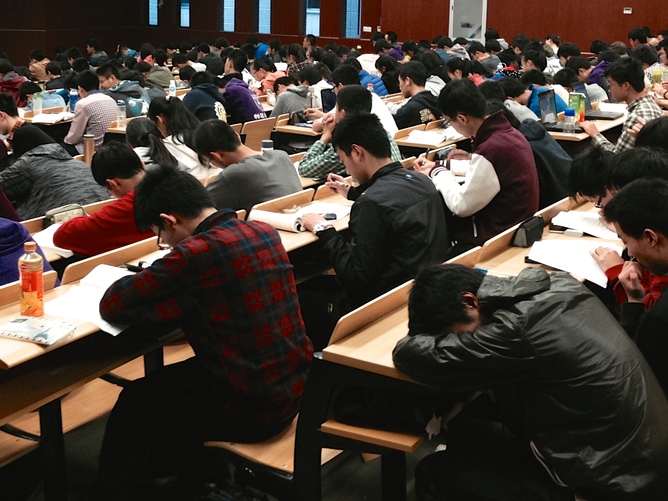Ineffective assessments, part VII: Better cultural and learning understanding

Click here to read all of the articles in our Ineffective Assessments series.
Not all students are natural-born test takers. Any educator who has spent even a small amount of time in classrooms knows this – much in the way that different students have different learning styles. Most times, teachers can account for this in their classrooms based on the students they serve. Even if the teachers do not adjust the tests or assignments from one year to the next, their general demographic remains the same from one year to the next based on location. An inner city math teacher, for example, could tweak his tests with word problems that best relate to the students entering his classroom and not use obscure references that make the material seem even more disconnected from the real life of the students. A science teacher at an elite prep school could do the same, using references that strike a chord with the students who walk through the door and grounding the material.
Statewide assessments don’t have that level of customization. They are created for one set of students and then applied to the rest. A student who feels isolated from the material in front of her will not be as successful in answering the questions, plain and simple. English as a second language learners, for example, may not perform as well on assessment tests as their peers. Standardized assessments make many assumptions about those who are taking them and to the detriment of the students. For assessments to be effective, the student answering the questions should always be considered.
So what sorts of cultural differences should be considered when assessments are created?
- Socioeconomic status. Students from homes where one or both parents have a college education tend to have more advanced linguistic capabilities and accomplishing school tasks comes more easily than students from economically disadvantaged homes. This is not to say that test questions should be easier or in any way “dumbed down” based on the income of a family in question, but assessments should be carefully written with these factors in mind. Perhaps there is a reason beyond basic comprehension that white students from middle and high-class homes tend to perform better on standardized tests. Perhaps it is not the actual material that they have more effectively mastered, but the actual tests that have put them at an advantage. If every student had the chance to take a test that played on his socioeconomic strengths and avoided pitfalls that made that student feel isolated from the material, perhaps we would see a drastic change in test scores. Considering the socioeconomic status of students is a very important part of the assessment process that needs to be addressed for all students to succeed.
- What is spoken at home should play into the type of assessment students receive. Students who speak English as a second language, even fluently, should have the option to take their assessments in whatever language makes them the most comfortable. There should never be a debate about whether a student knows “enough” of the English language to perform well on an assessment. If there is even a question, the student should be given the test in his native language or at least asked for the preference. If we are truly trying to gauge what these students know, we should not force them to battle the language barrier to present that knowledge. Students should be allowed to request tests in whatever language makes them the most comfortable – no questions asked, and no hoops to jump through.
- Learning style. This one is a little more complicated to implement and possibly a pipe dream at this point in the assessment reform process. BUT a perfect assessment system would allow students to answers questions in such a way that complemented their personalities and learning styles. Teachers could help determine this through their observations of the students. The trick would be to ensure that all the material was equally difficult and that the students were placed with the right test based on their true learning style. A student who did well in traditional test taking, for example, may perform worse in a testing environment that was tailored to visual or hands-on learners. This type of assessing would need some trial and error to get right but could end up yielding big results in student test success. It’s something that would need a lot more research and testing before implementation, but I believe it is worth the effort to reach a point of truly fair and accurate assessments.
One of the largest arguments against standardized assessments is that they are just that – standardized. To give a full picture of what students are learning, assessments need to be customized to fit those students’ life circumstances and personalities. It is contradictory to say that American public schools embrace students from all backgrounds, and at all learning levels, and with every personality type but then to test one model student that is not an accurate representation of any of them. This doesn’t further our educational pursuits, and it certainly does not further the academic success of the students who take the tests. Blanket assessments are not even an accurate representation of a teacher’s strengths. By trying to accommodate the masses, assessments have left behind the individuals and the result is a system of testing that does nothing to help anyone in the process and contributes little to what we truly know about actual student progress.
As they exist today, standardized assessments are ineffective, misleading and not helpful to public school culture. By adjusting these tests to meet the individual needs of the students taking them, the assessments would at least stand a chance of mattering in the lives of the students who take them.
It may be impossible to tailor each test to the needs of the student who will take it, but as technology improves, I believe the tools will exist to make this at least partially a reality. Consider an assessment future where teachers can type in a few short answers about a student and then receive a customized test based on the responses. We have the technology through our smartphones that tell us right down to the grocery store aisle what is for sale – surely there is a developer out there who can do the same targeting for test making. We should be able to create the tests that will most benefit our students and give educators the most accurate picture of what is being learned and comprehended.
As assessment makers become more technologically sophisticated, so too should the tests. States should demand these types of options of their test makers in the best interest of their students. There is no reason not to pursue more advanced forms of test delivery that take the backgrounds and learning styles of students into account. At this point, that type of test reform is necessary to understand what is being taught and learned in our K-12 classrooms.
Assessments of the future
It’s time to tear apart the traditional way our K-12 students have been tested and look for a more targeted approach that implements technology, focuses on information gathering and accounts for the differences between the students who take the assessments. It will take a lot of work, and it will cost some money, but the result will be effective assessments that tell us something about the progress of individual students. If we want to make our public schools places that deliver the brightest minds of their generations, then we owe it to these students to make testing fair and beneficial to them. It should not simply be a process of measuring sticks and statistics; assessments should give us a wider, detailed perspective on what our students have learned so far, how they’ve learned it and what their learning outlook is for the future.






